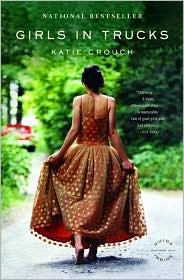I read this book because my mom liked it. Though when I was growing up, my mom was a great reader of Harold Robbins, since I claimed writing for my own life, she’s become a champion reader, often lending me terrific literary books that I haven’t read. She understands the nature of story–in fact, her understanding of the nature of story probably has everything to do with my being a writer at all.
I’m not a fan of negative book reviews, so I’ll say that I did not love this book, and hang my head while I try to work through the reasons for that. I realize, now, that this is the great flaw of this whole idea of a What I’m Reading column: I want people who might submit to Engine Books to have a bit of an inside look at my reading life, but I hate negative book reviews. But damn! I’m about to write one.
This book took me a little under four hours to polish off whole, in one sitting, last night while I filled up an evening on my own (husband at AWP like everybody else). Generally, the characters and situations are pretty likable. But what is this book? Is it stories? Is it a novel? The blurbs suggest a novel, but once I worked my way through several chapters that didn’t cohere and/or presented the same material, repeated, that would only be necessary if the chapters were stand-alone stories, I got confused. Surely a good book editor–as opposed to a bunch of good story editors, who consider each piece as a separate item–should have advised the author to work through those weird overlaps when putting the parts into the whole. Right? Or are readers so short-sighted that they need to be reminded about every little detail twenty pages after it occurs?
Something bigger bothered me through the whole book, though: More or less every line of tension was familiar to the point of seeming directly derivative. I’m not one of those readers who prizes originality over context and character. But when an entire plot line or two feel almost eerily similar to The Best of Everything, and another almost painfully recalls an Anne Rivers Siddons novel I read in college, I get kind of uncomfortable in the world of the story.
Another thing that happens is that I begin to worry about my own work’s echoes. Surely Katie Crouch did not deliberately rip-off existing work: what would be the point of that? Yet those echoes ring throughout the book. (I wish I’d written them down as I went–more or less every chapter spoke directly and often artlesssly to something else I’ve read. But I was reading in bed, all in one sitting, and many of them slipped my mind. As you can imagine, I’m disinclined to re-read just to figure it out.) Then I wonder: What did I steal the other night when I sat down to write? What have I dredged up from my readerly subconscious memory and onto my own pages? Gulp.
There’s a reason “derivative” is the sneering insult of fanboys with limited fields of vision, and I’m a little ashamed to use it here. Everything we do derives from our reading lives, from our long-established relationship with language and storytelling, established, no doubt, from our reading histories. There’s a dramatic difference between the kind of “derivative” that gets you accused of plagiarism, the kind that serves as an empty put-down designed solely to build up an auteur who, by contrast, is deemed “original,” and the kind that marks a book of character-driven fiction as unsatisfying. This book was like an Applebee’s salad: They seemed kinda good in college, when they were open late enough for me to go after working a restaurant shift and I hadn’t really ever spent any time lunching at independently-owned eateries. But I’m no longer interested in the kind of book I can get at any highway exit in the greater Midwest. I want something memorable, that might make me think about what a book or a salad can do in new, though not necessarily bizarre or shocking, ways.

